From convicts to The Castle: How real estate created, and could destroy the Australian middle class
Home ownership = the middle class = political stability
Trying something a little different with this article. I'm dipping my toe into making grand sweeping generalisations about history in order to say something about the present. I really enjoyed writing this one, so I hope you enjoy reading it. If you are an actual historian upon whose turf I am so recklessly treading, I sincerely apologise.
Have you ever wondered why an Australian working-class receptionist has been able to enjoy a comfortable life and retirement, while in other countries, this very same job is a predictable marker of poverty? Or why your semi-conscious gronk of an uncle is able to act like he's Warren Buffet because he had the deep wisdom to buy a house in 1978? Or why Australia has never really experienced any serious political upheaval, civil wars or revolutions compared to other, older western countries?
An eclectic group of questions!
My answer to all three is the same: Australia has enjoyed a readily available and easily understood path to middle class wealth, otherwise known as home ownership.
The Australian middle class is one of the largest and wealthiest in the world. Why is that? Could it be that we are just a nation of rare and brilliant geniuses? Is there something in the water? After all, your gronk uncle could be considered the Steve Jobs of smashing tinnies. Where's his Nobel Prize? Where's his Harvard commencement speech? At least he has a jet ski.
To the contrary, the Australian Middle Class did not create its considerable wealth through innovation, ingenuity, or shrewd investments. Normal, working-class Australians have enriched themselves through doing what they already wanted to do - buying their forever home.
But now, with the worsening state of the housing crisis, decades of bad policy and the crushing weight of macroeconomic trends have all accumulated towards an inflection point, where the promise of social mobility is being obliterated before our very eyes.
With each year that goes by, Australia is inching towards a New Normal where housing becomes the defining difference between the haves and the have-nots. Those who got on board the property train before it left the station, and those who were born too late. A predictable economic indicator as to whether or not Future Gronk Uncles (FGUs) will attain middle class wealth.
The risk of this trajectory being that in a generation or two, land ownership could return the realm of intergenerational wealth and landed gentry, with everyone else stuck in an inescapable neo-feudal crab bucket of modern serfdom.
Why am I constantly looking for new ways to whinge about this? Australia has been around for a while now and the working-class has always managed to buy a house - so why is today different? Well, to answer that question, we first need to understand the way the relationship between home ownership and the middle class has evolved, and is still evolving throughout the history of Australia - because this time, it is different.
Australia was founded as a penal colony
an investment property
As the industrial revolution was emerging in Europe in the mid to late 18th century, the efficiencies created by new machinery put immense pressure on the working poor, creating a surge in petty crime and a subsequent overcrowding of prisons. Widespread economic hardship was a key driving factor in what would become an extremely violent and turbulent era in Europe. Think powdered wigs, tri-corner hats, child labour and of course, guillotines.
During this period, the European aristocracy were obsessed with ideas of overcrowding and "human waste". The colonies of The New World were in part seen as an opportunity to export "the idle poor", take pressure off of overcrowded cities and prisons, basically getting rid of anyone they didn't like - including the homeless! A masterstroke in domestic policy. The past is a horrible place.
But the British had a not-so-subtle ulterior motive. Through this massive, sustained transfer of raw human mass, the colonial powers would embed a workforce on the other side of the world that could capitalise on the vast untapped resources of the New World. Cheap or free labour was considered to be essential for the profitability of colonial ventures - have you seen the startup costs for a new country these days?!
You can just imagine the conversation:
Silly Hat Guy 1:
"My King! What are we going to do about all of these horrible poors?! The smell my King! The smell!"
Silly Hat Guy 2:
"Uhhhh my King, might I interject? Nobody is really biting on our plan to create a horrible, exploitative labour camp on the other side of the world 😞. Honestly my King, I'm really starting to doubt whether I have what it takes to be your Silly Hat Guy."
The King:
*Wry smirk* "Are you lads thinking what I'm thinking?"
Silly Hat Guy 1:
*Nodding as he catches on* "Now this is why you're the big fella! We have the best King you guys, I swear."
Silly Hat Guy 2:
"Opium, anyone?"
If you think about it for more than two seconds, of course this was the real reason for putting prisoners on the other side of the world for largely non-violent property crimes. It is self-evident that building a few new prisons or reducing sentences for minor crimes would have been way cheaper than starting a new civilisation in what was quite literally the most remote place in the world during this period.
It would be like opening a burger joint on the moon, when there’s still plenty of suburbs without one - you simply would not do it.
In this way, the Australian penal colony was just one of the many models of indentured servitude and outright slavery employed by the colonial powers that served as a tool to kidnap the unfortunate poor and exploit them for free labour in the colonies.
The Australian frontier presented a powerful promise of escape and opportunity for early migrants
In the early to mid-19th Century, the working class was still at a major disadvantage in Europe. Any emerging mercantile opportunities still had to compete with centuries of established intergenerational wealth, royal titles, and social gatekeeping. Actively seeking wealth in the style of today's Hustle Culture was seen by the landed gentry as ugly, gauche behaviour - there was nothing more abhorrent to the aristocracy than New Money. *Sniffs handkerchief in disgust*
If you were at the bottom of the food chain - living cheek by jowl in the newly industrialised cities of British Isles and various German principalities on the Continent, living conditions were in many ways far worse than Feudalism. These huddled masses lived desperate lives as swarms of destitute workers, pulling 12-16-hour days, six days a week in cotton mills and textile factories. These inhumane living standards were instrumental in fomenting the violent upheaval of the French Revolution, the Revolutions of 1848, and the Paris Commune.
The colonies of the New World acted as a release valve for these discontented European underclasses to escape the savage conditions, civil unrest and religious persecution of 19th Century Europe. If you were a miserable factory worker, an ambitious farmer or a religious weirdo, Australia presented a powerful promise of social mobility in a world dominated by monarchy, zero-sum wealth and fixed aristocracy. Both carrot and stick; escape and opportunity. Imagine how bad things would have to be for you to get on a boat, risking death and leaving behind everything and everyone you know for an uncertain future in a place you know literally nothing about? Europe must have really sucked, because people did it in droves.
This promise of upward advancement took the form of an offer for immigrants to homestead the untamed wildernesses of Australia. A promise of free land grants made it worth moving to the middle of nowhere to make your lot in life, without some second son of a Northumbrian Duke lording their undeserved status over you. The Gold Rush of the 1850s turbocharged this migration magnet further still. Between 1851 and 1871 the Australian population quadrupled from 430,000 people to 1.7 million as migrants from around the world flocked to Australia at the prospect of making their fortune.
Iterative genocides and ethnic cleansing of Indigenous Australians allowed the progressive expansion of the colonial frontier, creating seemingly endless opportunities for this promise of free real estate. For the European underclasses, this was an impossibly rare opportunity - unlimited tracts of land that didn't have to be seized from the aristocracy in violent revolution – but instead could be simply conquered from the natives and distributed to those who want it.
So, despite Australia's violent, exploitative origin story as a penal colony, this promise of free real estate via the endless frontier had this nice, easy way of resolving social unrest in a way that long-established and calcified Europe could not.
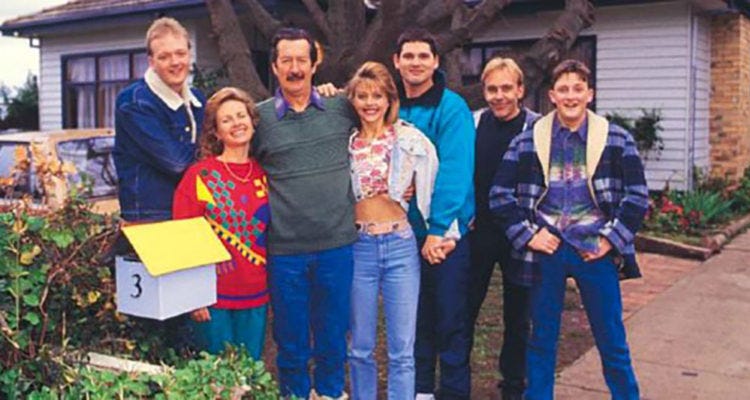
In the 20th century, the promise of free real estate became home ownership
The endless frontier was no longer possible in the fully developed economies of the 20th Century - so the promise of free real estate had to be sublimated into the similar-but-different promise of social mobility via suburban home ownership. The deal had changed, but it was still credible. Working-class Australians could still get skin in the game.
The 20th Century was no picnic, with everything from human history's most murderous wars, the Holocaust, the Great Depression, the Spanish Flu, stagflation, nuclear weapons and perhaps worst of all, the music of U2.
Throughout the 20th Century, the people who were somewhat insulated from these crises were those who had signed onto that promise of Australia - the people who owned homes. Globalisation undermined wages, inflation devalued savings and new technologies could make your job disappear overnight - but as long as you owned a home, your wealth was anchored to the overall prosperity of the country. Middle-class wealth was all but assured.
So much of the Australian middle class was built upon this promise of upward advancement through treating home ownership as an investment. Home ownership made being unexceptional rather profitable. All around the nation, Belligerent Gronk Uncles (BGUs) not only survived, but thrived - a good thing! After all, if you managed to hang onto a block of land, a typical Australian need not start a business, educate themselves on investing, pursue career advancement - or even a Career at all. We all know the trope of the 1950s shoe salesman comfortably supporting 4 kids and a stay at home mum, with 2 cars in the garage on an 800sqm block - all while enjoying a gambling addiction and a secret family 4 streets over. Truly blessed times.
So, whether "The Australian Dream" has meant assured social mobility through free real estate, or via suburban home ownership, this promise to the working classes has remained credible throughout our history – until now.
Enter, the Knowledge Economy
In recent decades, the proliferation of internet access and the maturing of decades-long globalisation trends have transformed Australia into an almost entirely demand-driven services economy. Yes we have mining, but the rest of us are basically just sitting around making websites for eachother. We are not a serious country.
From this era emerged the Knowledge Economy, where a generation of highly specialised white-collar jobs would play a much larger role in the economy.
The key defining spatial impact of the mass proliferation of knowledge work is its concentration in major cities, at the expense of regions. While you can still be a teacher wherever there are children, a cop wherever there are criminals, and a real estate agent wherever there are victims – if you want to achieve any modicum of success in a white-collar career, you are well and truly shackled to one of Australia's 3-5 major cities.
Thanks to the Knowledge Economy, that incredible magnetic power and value of an endless frontier was completely negated over a couple of short decades. 86% of Australians now live in urban areas. Despite the relative size and emptiness of the country, finding your fortune out in the middle of nowhere no longer has the same purchase, unless you're hunting for coal seam gas.
For the housing market in major cities, the impact cannot be overstated. Now, most Australians are forced to compete with each other and international investors in a bloodthirsty free-for-all over a relatively fixed amount of increasingly unaffordable properties. A century ago, many more would have sought to settle in the regions, which actually had viable prospects in agriculture, manufacturing and mining. In the 1930s, less than 30% of the population lived in Australia’s main capital cities. Now, 67% of Australians live in a capital city, with approximately 92% living in cities more broadly.
This and a million other factors are now iteratively pricing the working class out of the housing market. With each year that goes by, the bar to home ownership gets higher, and the group of people who can't attain it gets larger.
So, the Knowledge Economy has changed the working class's relationship to housing and wealth yet again. Without this affordable and easily understood path to social mobility, what comes next?
Home ownership = the middle class = political stability
As I've argued recently - the housing crisis is a political and economic emergency, and we're not acting like it. The toothless, too little, too late and too short-sighted policy responses to date are an order of magnitude short of the mark and will not make a dent in the problem.
To quote a very charitable article in The Conversation by Hal Pawson:
“…announced measures are somewhat disparate and many are extremely modest alongside the scale of these problems. To make a real difference, they will need to be expanded and extended over a longer time. They must be complemented by tax and regulatory reforms as yet eschewed.
If the measures to date prove to be a down payment on ambitious and purposeful future action, they may come to be seen as significant. If not, policy analysts of the 2030s will deem them of little importance.”
Imagine if you had a malignant tumour and your oncologist prescribed less than half the chemotherapy required just to stop the tumour growing - that's the level of seriousness in the policy response from the feds so far.
If you accept the premise of this article, that access to home ownership has been the primary vehicle for social mobility and financial security in Australia, then it follows that the political stability of the country cannot be separated from home ownership.
Millions of people who were ideologically bought into The Australian Dream™ are becoming alienated from it. We are creating an ever-increasing caste of people without a stake in the system and that should worry us. The implication for our politics being the erosion of the formerly stable polarities of acceptable discourse and ideas that has defined the Australian political centre for generations.
To land on my trademark Disheartening Final Word (DFW), we are rather recklessly toying with what is perhaps the single most fundamental pillar of Australian civilisation and we do so at our peril.
Subscribe to my Substack!
As a subscriber, you’ll get my full articles (complete with images) in your email inbox - sparing you having to go to the actual website or be lucky enough to spot my articles in your feed. For whatever reason I find this a much more enjoyable and consistent way to read the writers I follow, so if you have enjoyed any of my articles so far, please subscribe.





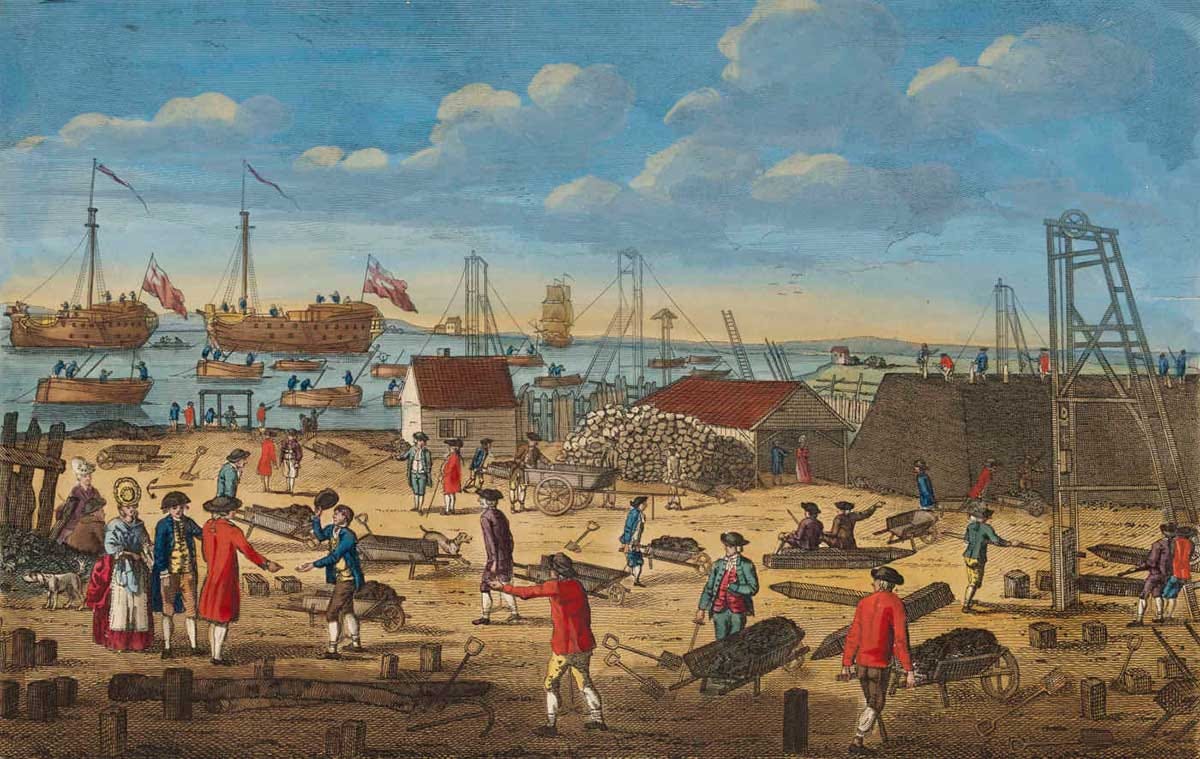
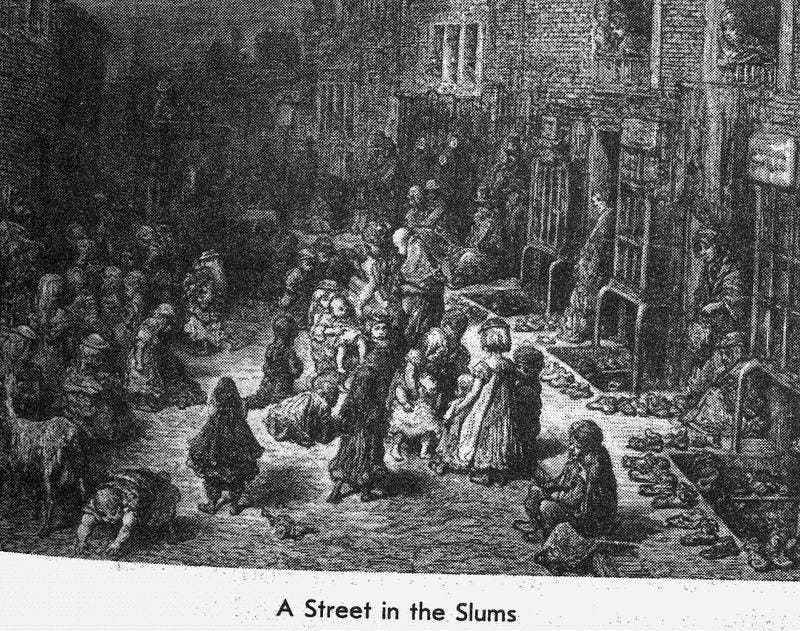

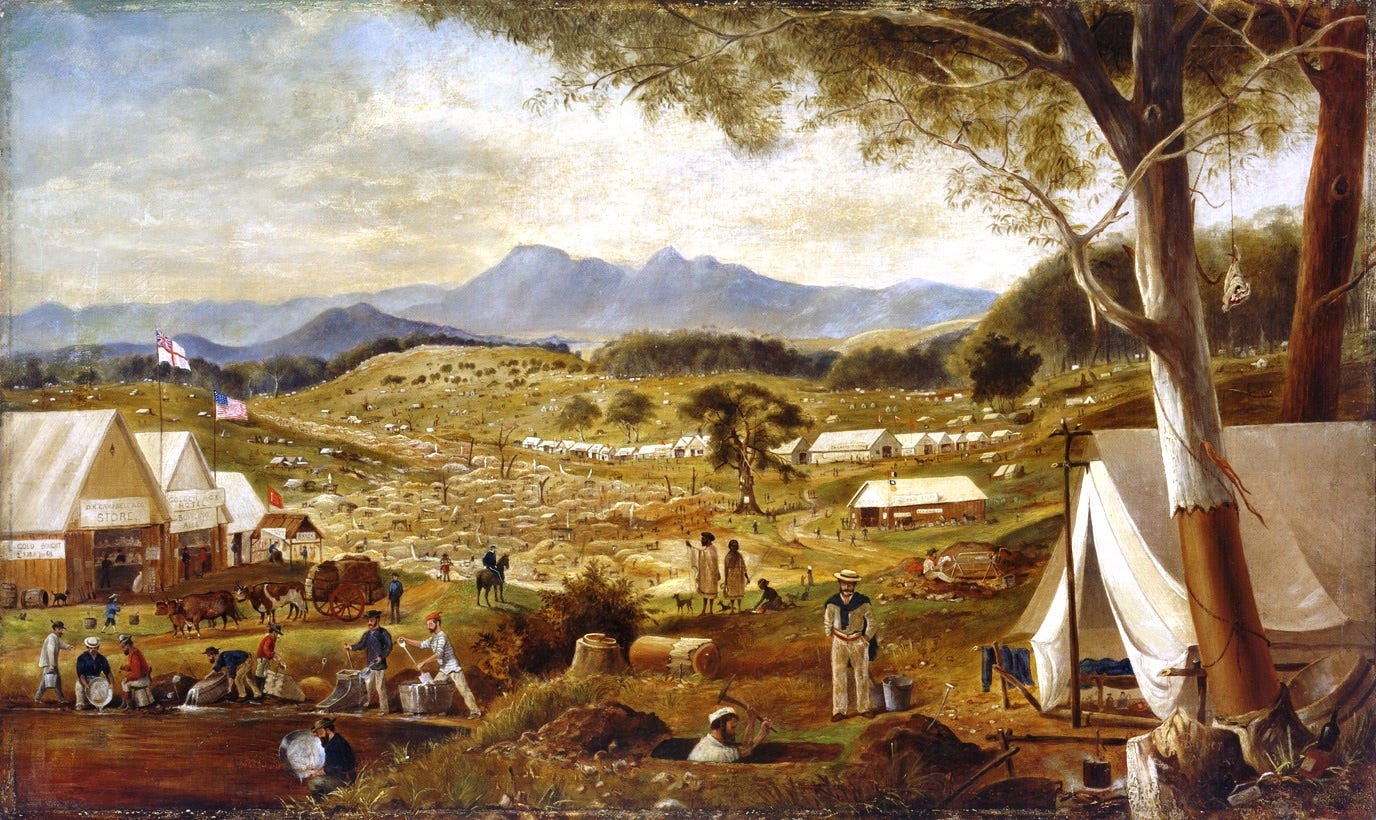
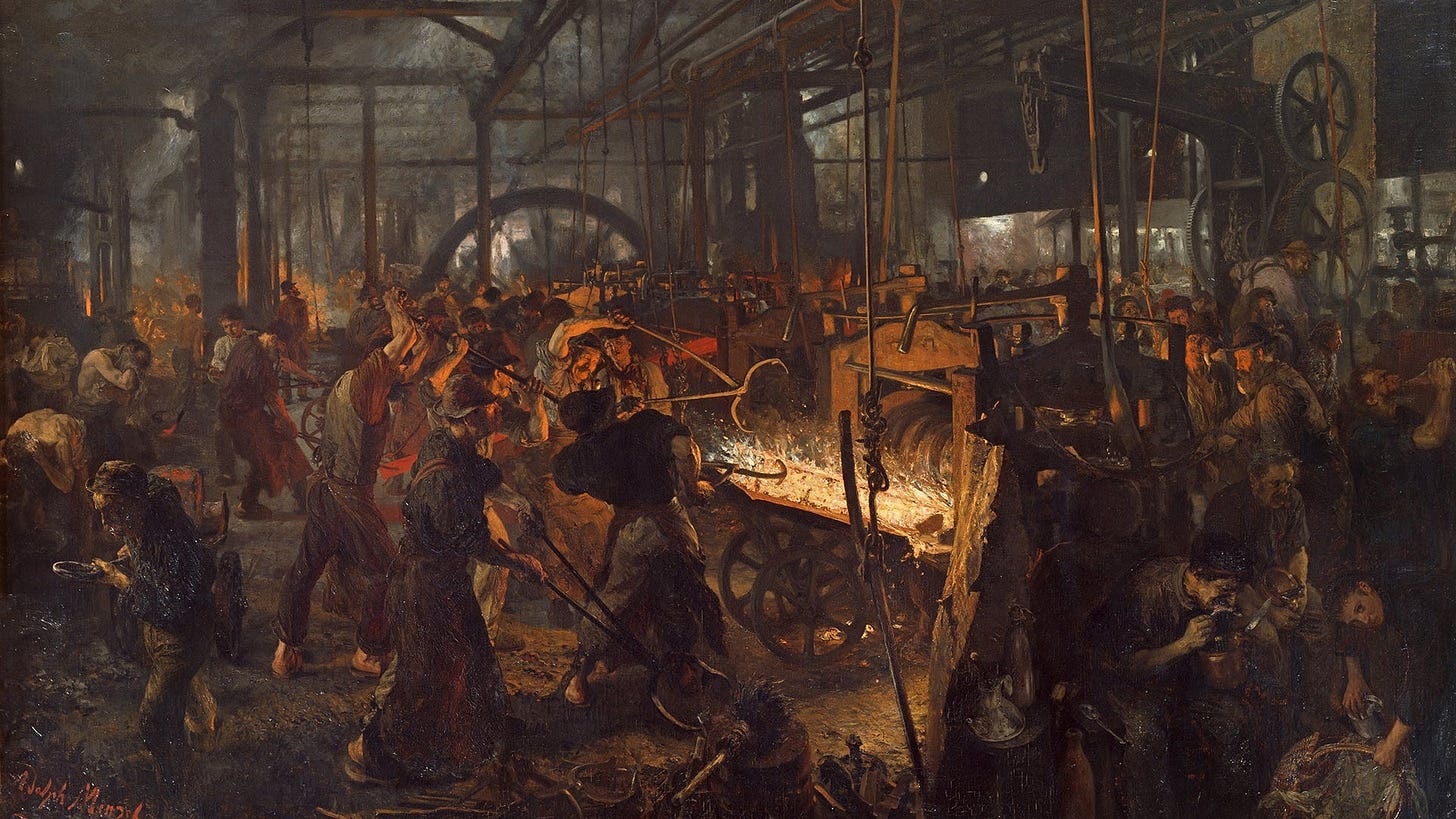

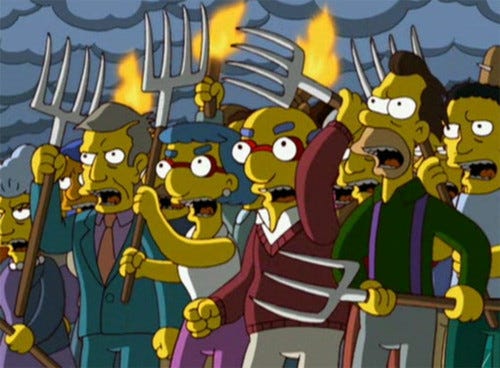
Thanks for this, I really enjoyed it. I will respond with my own eclectic stories.
While not a historian, I am a family historian and it is an eye opener to go back and look at the broader context of family history to see what was happening around that time.
My Flanagan side were obviously Irish and predictably convicts. The first one was sent out in 1825 (per-famine) and I doubt I would be here if he was still in Ireland at that time. Still from a convict start he eventually had property rights (not freehold) on what was the original Yarralumla Estate, which now forms part of the G-G house in Canberra. So that was a big step up from convict to property right holder in the space of 30 years. But one thing I did note in my research was the strong intent and desire of the British colonist to recreate a class society, including the yeoman farmer. It was mainly the Irish, who had experience in this area, that pushed back hard and eventually we had a more egalitarian society (up to a certain point in time and effect).
My ex-wife on the other hand descends from German stock and I was shocked to realised that when they emigrated in 1849 they still had to get permission from the Dutchy to emigrate. In other words they were still living a serfdom life. No wonder so many people from such countries took up the opportunities, despite the negatives, when the various Australian states were begging for migrants (pre-gold rush).
Then my father. Classic depression era child. His father was a renter and my father was destined to become one of the labouring renting class untill WW2 intervened. I highly recommend you look into the Chiefly Labor Government "Commonwealth Reconstruction Training Scheme (CRTS)" established in 1942 with a view to retraining, reengaging and bringing cheaper housing to returning servicemen well before that war ended. It was his changing door moment that brought about his own Uncle Gronk moment - being able to buy a house in the middlest suburb in middle Sydney. That scheme was ground breaking in its depth and impact and it makes you wonder why we can't have the courage to do something similar anymore!
I noticed that we are currently looking to recruit non-Australians into the Army, presumable because Australians don't want to join. My immediate thought upon hearing that story was I wonder if young people will rush to defend Australia if we get entangled in a war. What stake or loyalty do they have to a country that has effectively locked them out of future affordable home ownership that a Uncle Gronk like me enjoyed?
This link gives the bare bones of the CRTS https://en.wikipedia.org/wiki/Commonwealth_Reconstruction_Training_Scheme
Yep a great article Menzies promoted home ownership I suspect for the reasons you outlined. Hawke and Keating employee share schemes for similar reasons. Upward social mobility has long been a characteristic of life in Australia and its demise is already manifest in the splintering of the two party vote and a growing skepticism about the benefits of capitalism. FYI my great grandfather migrated here in 1850s for the exact reasons you outlined. You may find it informative to look at the property booms and busts in the 1850 forward. It has not all been smooth sailing.